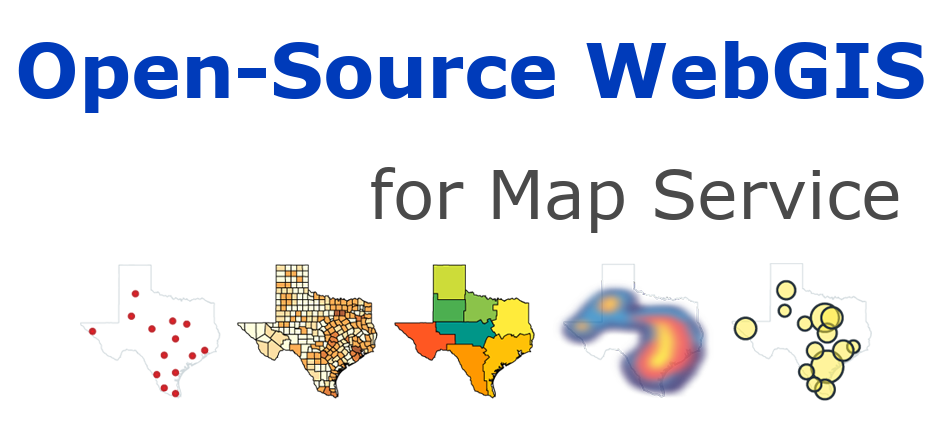3.4. MapServer interaction: layer control#
Author: bukun
Update: 2022-10-7
3.4.1. How to control layers#
Being able to turn map layers on and off is a standard feature of web mapping applications. There are many ways to accomplish this using form objects as control. You can use the drop box/menu, check boxes, and/or radio buttons. In this example you’ll see how to implement layer selection using check boxes and drop boxes.
Here is the corresponding Mapfile:
1MAP
2 IMAGETYPE "PNG"
3 EXTENT -180 -90 180 90
4 SIZE 600 300
5 SHAPEPATH "/gdata"
6 IMAGECOLOR 255 255 255
7 FONTSET "../fonts/fonts.list"
8 PROJECTION
9 "init=epsg:4326"
10 END
11 TEMPLATEPATTERN "tmpl-*"
12 WEB
13 TEMPLATE "to be replaced by map_web_template variable in section2.html"
14 IMAGEPATH "/owg/ms_tmp/"
15 IMAGEURL "/ms_tmp/"
16 METADATA
17 "wms_title" "WMS Demo Server"
18 "wms_onlineresource" "http://192.168.4.211/cgi-bin/mapserv?map=/mstu/htdocs/example2.map&"
19 "wms_srs" "EPSG:3857 EPSG:4326"
20 END
21 END
22 LAYER
23 NAME "land"
24 DATA "land_shallow_topo_8192.tif"
25 STATUS OFF
26 TYPE RASTER
27 END
28 LAYER
29 NAME "topo"
30 TYPE RASTER
31 CONNECTIONTYPE WMS
32 CONNECTION "http://wcs.osgeo.cn:8088/service?"
33 METADATA
34 "wms_srs" "EPSG:4326"
35 "wms_name" "maplet_i887"
36 "wms_server_version" "1.1.1"
37 "wms_format" "image/jpeg"
38 END
39 PROJECTION
40 "init=epsg:4326"
41 END
42 END
43 LAYER
44 NAME "states_poly"
45 DATA "wcountry.shp"
46 STATUS OFF
47 TYPE POLYGON
48 LABELITEM "NAME"
49 CLASS
50 NAME "States"
51 STYLE
52 COLOR 232 232 232
53 END
54 END
55 END
56 LAYER
57 NAME "states_line"
58 DATA "wcountry.shp"
59 STATUS OFF
60 TYPE LINE
61 CLASS
62 NAME "State Boundary"
63 STYLE
64 COLOR 132 132 32
65 END
66 END
67 END
68 LAYER
69 NAME "wriver"
70 DATA "wriver.shp"
71 STATUS OFF
72 TYPE LINE
73 CLASS
74 NAME "World River"
75 STYLE
76 COLOR 0 0 255
77 END
78 END
79 END
80 LAYER
81 NAME "wroads"
82 DATA "wroads.shp"
83 STATUS OFF
84 TYPE LINE
85 CLASS
86 NAME "World Road"
87 STYLE
88 COLOR 100 200 100
89 END
90 END
91 END
92END
Notice how the layer STATUS has been changed to OFF except for the “States”
polygon background.
The states background was left as default so our map will always have something
when drawn without any layers turned on.
The users of our application should have control of which layers to turn on or leave off.
You’ll understand how the layers are turned on/off by MapServ if you look at the:
<form method="get" action="/cgi-bin/mapserv" role="form">
<fieldset>
<legend>Layer control form</legend>
<br>
<!-- The following two variables are user defined variables.
MapServer will pass its value to the HTML template if the
proper tags are found, in square brackets "[]" -->
<input type="hidden" name="root" value="/owg">
<input type="hidden" name="program" value="/cgi-bin/mapserv">
<!-- The map and layer variables are internal MapServer variables.
They are required by the mapping application. -->
<input type="hidden" name="map" value="/owg/mfu3.map">
<input type="hidden" name="layer" value="states_poly">
<input type="hidden" name="zoom" value="0">
<!-- The map_web_template variable will replace the TEMPLATE
parameter in the WEB object of the MAP file... -->
<div class="col-sm-12">
<div class="col-sm-3">
<select name="map_web" class="form-control">
<option value="template tmpl-example-u3.html">Layer control</option>
</select>
</div>
<div class="col-sm-2">
<input type="submit" name="submit" value="Open the tutorial" class="btn btn-primary">
</div>
</div>
</fieldset>
</form>
3.4.2. Open and close map layers#
The demo could be opened directly via the following link:
<a href="/cgi-bin/mapserv?map=/owg/mfu3.map&layer=states_line&zoom=0&mode=browse&root=/mstuto&program=/cgi-bin/mapserv&map_web=template+tmpl-example-u3.html"
target="_blank">Open layer control page</a>
<hr/>
The following shows a form submission, and various parameters are passed through the hidden input control. The effect is the same as above:
<form method="get" action="/cgi-bin/mapserv" role="form">
<fieldset>
<legend>Layer control form</legend>
<br>
<!-- The following two variables are user defined variables.
MapServer will pass its value to the HTML template if the
proper tags are found, in square brackets "[]" -->
<input type="hidden" name="root" value="/owg">
<input type="hidden" name="program" value="/cgi-bin/mapserv">
<!-- The map and layer variables are internal MapServer variables.
They are required by the mapping application. -->
<input type="hidden" name="map" value="/owg/mfu3.map">
<input type="hidden" name="layer" value="states_poly">
<input type="hidden" name="zoom" value="0">
<!-- The map_web_template variable will replace the TEMPLATE
parameter in the WEB object of the MAP file... -->
<div class="col-sm-12">
<div class="col-sm-3">
<select name="map_web" class="form-control">
<option value="template tmpl-example-u3.html">Layer control</option>
</select>
</div>
<div class="col-sm-2">
<input type="submit" name="submit" value="Open the tutorial" class="btn btn-primary">
</div>
</div>
</fieldset>
</form>
